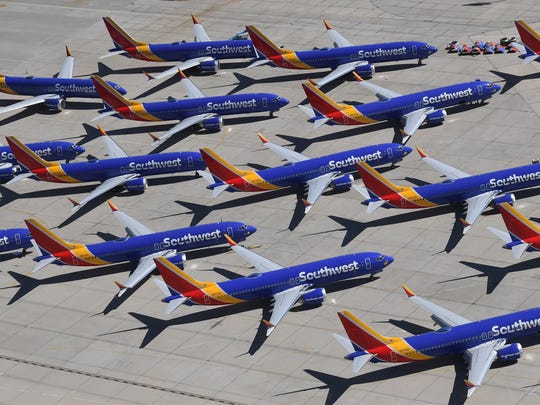‘These memos definitely don’t help’: Damning Boeing emails add to anxiety about safety
When Boeing changed course this week to recommend simulator training for pilots before the troubled 737 Max returns to the skies, it was seen as a move to boost traveler confidence in the plane’s safety.
And then came Thursday’s damning emails, the release of 100 pages of internal exchanges at Boeing during the development of the Max and beyond. They show a corporate culture focused on rushing a plane into service with training shortcuts and moves to evade scrutiny from regulators, airlines and passengers.
The emails, which Boeing says were mostly between technical pilots and employees involved with the development and qualification of Boeing’s 737 Max simulators, date from 2014 through 2018.
One of the emails from 2018 is even more concerning, now that Boeing wants pilots to train on its 737 Max simulators instead of computer-based training.
The Max was already flying passengers, and the Federal Aviation Administration and other regulators hadn’t required simulator training when it launched for pilots already trained on the Boeing 737 NG. Boeing said it wasn’t necessary.
In the email, two employees cast doubt on the safety of flying on a Max where pilots were trained in a simulator.
“Would you put your family on a Max simulator trained aircraft? I wouldn’t.”
The reply: “No.”
The workers said in the exchange they were among a small group of employees who are “only interested in the truth.”
The mother of 24-year-old Samya Rose Stumo, who was killed in the 737 Max Ethiopian Airlines crash in March, blasted Boeing in a statement issued by her law firm.
“The internal Boeing memos just reinforce the impression that they don’t really care about whether passengers live or die, they care about protecting their own company,” Nadia Milleron said in the statement.
Adele Abrams, a Southwest Airlines frequent flyer who travels weekly in her job as an occupational health and safety attorney, said she has been skittish about returning to a Max since the planes were grounded following two crashes that killed 346 people in less than five months. Boeing’s “smoking gun” emails, as she describes them, only add to the worry.
“Frankly, it now has me a bit more concerned about flying on any Boeing aircraft,” she said.
Southwest Airlines Boeing 737 MAX aircraft are parked on the tarmac after being grounded, at the Southern California Logistics Airport in Victorville March 28. After two fatal crashes in five months, Boeing is trying hard to present itself as unfazed by the crisis that surrounds the company. (Photo: MARK RALSTON, AFP/Getty Images)
The emails are the latest revelation to hinder Boeing and airlines’ carefully crafted plans to convince skittish passengers the plane is safe when it’s approved to fly again, veteran travel industry analyst Henry Harteveldt.
“These memos definitely don’t help,” he said. “There are going to be some passengers out there who look at this and it increases their concern and anxiety about getting on a 737 Max.”
And there’s the potential for the concern to extend beyond that, he said.
“Not only do they further weaken confidence in the 737 Max, they also paint a pretty caustic picture of Boeing and its culture itself. There’s the potential that it could cause some people to be concerned about flying on Boeing airplanes, period.”
Boeing said in a statement Thursday that the emails “do not reflect the company we are and need to be, and they are completely unacceptable.”
Harteveldt said the never-ending Max drama is “the proverbial death by a thousand cuts type of situation.”
He said infrequent flyers are the most likely to be alarmed as many were already skittish about the plane. In a survey Atmosphere Research released in June, more than 2 in 5 passengers said they would take flights that are less convenient or more expensive to avoid the Max.
It’s important to note, Harteveldt said, that many of the emails are old. Boeing’s decision earlier this week to recommend simulator training for pilots is a big plus.
“That will be extremely helpful because that is something that the airlines are in charge of,” he said. “The pilots can speak credibly about the training they’ve received.”
He said the simulator training is likely improved from that mentioned in the emails, given what Boeing and regulators have learned since the two Max crashes.
“That may lead to improvement in the simulator software, the simulator behavior and the training that the pilots receive,” he said.
Regarding the Max simulators, Boeing said Thursday the comments in the emails refer to early simulators. Boeing said it is confident its Max simulators are “functioning effectively” today.
“The simulator software has been constantly improving during this time, through repeated cycles of testing, qualification, and revision of the software code,” the company said.
The FAA echoed those comments in its statement after the emails were released.
“The FAA maintains a rigorous process for qualifying flight simulators,” the agency said. “Upon reviewing the records for the specific simulator mentioned in the documents, the agency determined that piece of equipment has been evaluated and qualified three times in the last six months. Any potential safety deficiencies identified in the documents have been addressed.”
Source: Read Full Article
